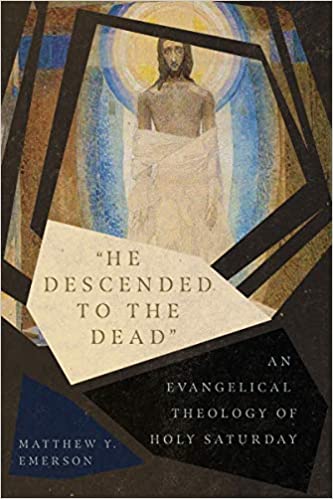A Book Review from Books At a Glance
By Mark Baker
Matthew Emerson (PhD, Southeastern Baptist Theological Seminary) serves as associate professor of religion at Oklahoma Baptist University. He is the author of several books, including Baptists and the Christian Tradition, and he appears to be a new leading voice among evangelicals working towards theological retrieval.
The goal of the book is to provide a biblical, historical, and theological case for what Jesus did on Holy Saturday. The clause “he descended into hell” is present in both the Apostles’ and Athanasian creeds. Emerson argues that this clause refers to Christ’s descent into “the place of the dead,” which includes three compartments: Paradise, Hades, and Tartarus. Paradise refers to the place for the righteous dead, Hades for the unrighteous dead, and Tartarus for fallen angels.
Emerson does not succumb to mere proof-texting to build his argument; rather, he patiently develops the storyline of the Bible to make his case. Before exegeting 1 Peter 3:18–22 (a key passage in the conversation), Emerson looks at many other texts both in the Old and New Testaments that support his thesis. Emerson proves to be a faithful guide in his exegesis and summary of the pertinent literature.
From a historical point of view, Emerson’s argument fits with the majority of interpreters throughout church history, especially prior to the Reformation. He is conversant with the church fathers, Greek Orthodoxy, Roman Catholic and Reformation theologians, and modern theologians from Barth to Balthasar to Grudem. Based on his exegesis and supported by a historical argument, Emerson argues against Calvin’s novel position that Christ’s descent is wrath-bearing or atoning. For Emerson, Christ’s atoning work happened on Good Friday, not Holy Saturday. Christ’s descent is the beginning of his victory march, not the continuation of his suffering.
Emerson also disagrees with Wayne Grudem, who argues for the omission of the descent clause from the historic creeds. Grudem appeals to Philip Schaff’s references to the 4th-century theologian Tyrannius Rufinus, claiming that the descent clause was a late addition to the creed. Like the Bereans of Acts 17, Emerson diligently examines the cited texts and finds that Schaff has misread Rufinus, and Grudem has unfortunately popularized this misreading. Emerson’s conclusion is strong: his own reading of the descent clause is almost universally attested in the early church.
One of the most engaging parts of systematic theology is the examination of the interplay between two different doctrines. Theological categories do not stand alone like silos in a field; they are beautifully intertwined like a fabric. Emerson engages in this kind of study in the second part of the book. After convincingly stating his case in the first part, he shows how Christ’s descent provides a richer understanding of other elements of theology such as the doctrines of the Trinity, creation, and mankind. These reflections are doctrinally robust and devotionally rich.
Emerson is to be commended for remarkable clarity while untangling a rather complicated topic. There are, however, a few places that perhaps could have used some additional untangling. Emerson includes a helpful chart that diagrams the different compartments of the “place of the dead” that includes Hades as a term for the place of the unrighteous dead (33). But he also states that “the dead” refers to “Hades” in some places (47). The exact reference to “the abyss” is similarly unclear (48). Additionally, this is a wonderful devotional book that would be beneficial for educated laypeople. But some of the “in house” theological discussion (esp. ch. 6) might leave church members scratching their heads.
These minor quips aside, Emerson’s work stands out as perhaps the most accessible and devotional treatment on the topic. It is not a niche theological tome for experts; it is a book that magnifies the work of Christ and celebrates the reception of an important yet oft-misunderstood doctrine. Pastors should work through this book as a way to enrich their preaching on the person and work of Christ. Theological educators should assign it as a course text in both church history and systematic theology courses. Those interested in the historic creeds will want this book as a helpful guide not only for the descent clause but also as a resource for the Apostles’ Creed as a whole.
Mark Baker (PhD, Southeastern Baptist Theological Seminary) is assistant director and professor at the Southwestern Baptist Theological Seminary Darrington campus in Houston, TX.
Copyright 2021, Books at a Glance
